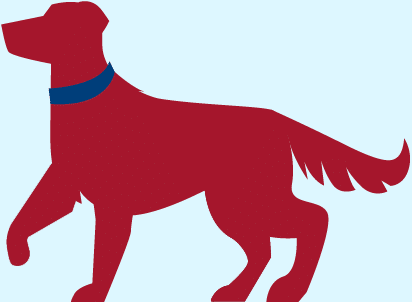
Alabama Rot FAQs
The best way to protect your dog is by better understanding CRGV. Below are our Alabama Rot FAQs.

Sadly, in most cases, dogs that develop sudden onset kidney failure do not survive Alabama rot. However, if the disease is identified early there may be an increased chance of a positive outcome. Therefore, it is so important to spot the symptoms early.
Unfortunately, there is currently no cure for Alabama rot. Research is still ongoing and without knowing the cause of Alabama rot it is incredibly difficult to find a cure. We’ll post any major developments on this website.
Yes, cutaneous and renal glomerular vasculopathy (CRGV) is also known as Alabama rot.
Although Alabama rot is rare, the disease is potentially fatal if dogs develop sudden onset kidney failure. Some dogs seem to develop a ‘skin only’ version of the disease without blood test changes of kidney failure. The outlook for these dogs is very good.
Research has shown that once the skin sores (lesions) appear, kidney failure is apparent an average of 3 days later; however, there is a wide range from kidney failure developing at the same time as skin sores, to >30 days after their development. If you spot an unexplained skin sore, then please speak to your local vet.
Currently, there is no answer to what causes Alabama rot. Research suggests that dogs are more likely to develop the disease between the November and May time period, and when they are walked in wooded areas following increased rainfall.
There are some breeds that appear more likely to develop the disease. This is not an exhaustive list, but those breeds include Labradors, English springer spaniels, Hungarian Vizslas and whippets. The disease affects any age of dog.
Skin sores (lesions) on paws and legs are a common sign, but legs are not the only place to check. Some dogs affected by CRGV have sores on their head, tongue, body and muzzle. They can appear as red, hairless areas with or without a skin defect (like an ulcer). There may be associated swelling. Other symptoms may include nausea and vomiting, decreased appetite and possibly an increase in thirst.
It is important to note, most skin sores will NOT be caused by Alabama rot. Skin sores can be caused by many other things and it is always best to seek your vet's advice.
As of today, there are no blood or urine tests designed to confirm if your dog has Alabama rot. Your vet with assess the sores and may check kidney function by sampling blood and urine.
From the research that has been carried out to date, there has been no indication that CRGV is contagious (passed from dog to dog).
As there is no definitive cure at this time, management revolves around pain relief and bandaging of the sores along with intensive treatment of the sudden onset kidney failure when needed. For those dogs with sudden onset kidney failure, a facility with on-site 24 hour care would be considered essential as decisions often need to be made on an hourly basis.
CRGV, also referred to as Alabama rot, is a disease that affects dogs. The disease damages a dog’s blood vessels in the skin and sometimes also in the kidneys. This can cause sores on the skin and may cause major problems for vital organs, resulting in kidney failure.
There are a couple of things you can do which may help protect your dog from CRGV. Every time you come home from a walk, wash your dog down thoroughly, removing all dirt and mud that may be in their coat. Educate yourself on the signs so you can identify possible disease early, potentially giving your dog a better chance of survival.
You can visit our website at any time to find out everything you need to know about Alabama rot. On our website, you can find out where confirmed cases are being reported and sign up to our newsletter.
There are many things you can do to help! You can support The Alabama Rot Research Fund (ARRF) to help further research into the disease, hopefully resulting in a cure! Visit the website for more details at the Alabama rot charity.
Spread awareness! Tell your dog walking group, your friends and your family members with dogs the symptoms to look out for.
If you are concerned about Alabama rot, contact your local vet immediately.
We are happy to help your vet if they are concerned your dog may have Alabama rot.
